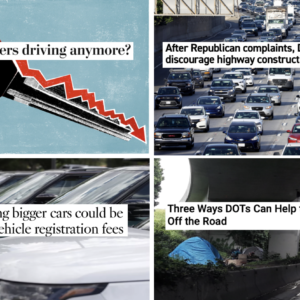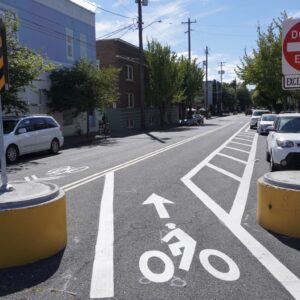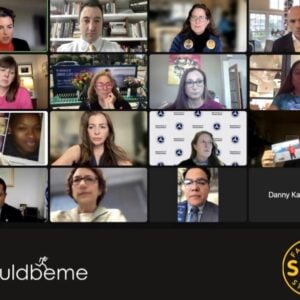The U.S. Department of Transportation reported yesterday that Americans drove 1.4 billion fewer highway miles in April of 2008 than in April of 2007. The report also said that this is the sixth consecutive month of declines and that Americans drove 400 million less miles in April than in March.
As gas prices rise, more Americans are realizing that driving a car isn’t always the best way to get around. They’re fleeing the suburbs, riding more buses and trains, and biking in record numbers.
But even with these changing behaviors, the U.S. DOT Secretary Mary Peters (who famously referred to bike lanes as not being “transportation infrastructure”) can only think of one thing — how to pay for more freeways.
In a statement released by the DOT, Peters said this decline in vehicle miles traveled (VMT) “highlights the need to find a more effective way to fund highway and construction maintenance.”
Instead of talking about how to accommodate this major shift in behavior — by, perhaps, encouraging more funding for non-automotive infrastructure or encouraging Americans to continue their energy-wise mobility choices — Peters’ comments instead treat this like a funding crisis and calls for “a more effective funding source than the gas tax.”
This report is sure to cause even more anxiety from the highway-building establishment. Their cash cow, the Highway Trust Fund is facing bankruptcy as gas tax revenue falls victim to not only decreasing VMT, but also to inflation and rising oil prices (which impacts the price of materials like asphalt).
Also in the statement, Secretary Peters seems to be in denial that people are driving less. She says, “past trends” have shown Americans will continue to drive despite high gas prices (but wait, didn’t this report just say that’s not happening?).
Peters also re-assured automakers by saying that people won’t drive less, they’ll just drive more fuel-efficient vehicles: “History shows that we’re going to continue to see congested roads while gas tax revenues decline even further.”
Peters’ concerns were echoed by Acting Federal Highway Administrator Jim Ray: “As positive as any move toward greater fuel efficiency is, we need to make sure we have the kind of sustainable funding measures in place to support needed highway and transit improvements well into the future.”
This drumbeat from federal bureaucrats will grow even louder in coming months as they position themselves to lobby for expanded highway funding in the upcoming Transportation Bill (set for reauthorization in 2009).
To delve further into the stats from the FHWA’s “Traffic Volume Trends” report, click here.







Thanks for reading.
BikePortland has served this community with independent community journalism since 2005. We rely on subscriptions from readers like you to survive. Your financial support is vital in keeping this valuable resource alive and well.
Please subscribe today to strengthen and expand our work.
Ok, this is only slightly off topic: regarding the \”biking in record numbers\” part, is there any way to throw your weight around and get a local news channel to have a bike safety and regulations segment? Once a week for the summer maybe? Just to let people know how NOT to threaten the lives of others when spinning around on their shiny Huffy\’s and whatnots.
You do control the bike media in this town, right? Right?
I always thought it was the fixies that didn\’t know how to operate in traffic.
*runs out of the room*
\”This drumbeat from federal bureaucrats will grow even louder in coming months…\”
Until they get thrown out on their a$$ because we elect Obama!
Well, in mild defense, it is her job to worry about funding. It is not our job to share her worry however.
And history has been that when Americans change to higher mileage vehicles they drive more. It\’s why I\’m reluctant to hitch my wagon to the high fuel price train. A tech break-through in battery tech and/or photovoltaics could reinstall the car as king.
just wait. \”Bike Road Tax\” in three…two…one…
http://www.dot.gov/contact.html
Will calling them have any impact whatsoever? Or, do you have a better way (other than through elections) to deal with this.
I was and am excited for higher gas prices for just this reason … maybee people will drive less. If it takes our roads falling apart first and then fixing the problem once a paradigm shift has occured away from the car then I am all for it, I\’ll just get out my mountain bike. WooHoo.
So if people will keep driving, just more efficiently, I would think that it would make sense to raise the gas tax, right? That way the same money is raised per mile.
I\’d love to see someone try to float that reasonable idea. Talk about political suicide with the right wing though…
Of course, fewer miles driven means less wear and tear, so less maintenance costs.
But, since costs to repair go up with the price of fuel, it\’s absurd that we tax our fuel per gallon, instead of per dollar spent on gas. If we did, revenues would go up with the increase in gas prices, offset by the reduction in driving.
Here\’s another no-brainer: tax studded tires!
well, to be honest – one year does not a trend make – and 6 months certainly doesnt either. government is a slow-moving beast, and given that VMT has risen in pretty much every year since the invention of the automobile… statistically speaking, VMT *ought* to continue to rise. everything the past has shown us indicates that it will.
HOWEVER! whereas there are those who consider the slowdown in VMT during the crunch in the 1970s to have been a mere levelling-off compared to what it appears were facing now – it may well be that were experiencing a fundamental shift in how, and how much, americans travel. frankly, i didnt really think this would really start to happen until gas hit $5-6. consider me pleasantly surprised. will it last? that remains to be seen.
but how nice would it be if they jumped on this opportunity to tell the american people – \”hey, gas aint gonna be going back down in price. given decreased VMT, the road infrastructure we already have should last us longer, and the money we save on reduced maintenance might be better spent on encouraging development of other, more efficient, more sustainable infrastructure. its high time we came up with a plan b.\” – but then, exit strategy and foresight havent been this administrations strong points.
And McCain wants to cut the federal gas tax altogether this summer… How will this affect that?
I was just watching an account of life hundreds of years ago, about how millions of people chose to starve to death rather than switch their diet from cereal grains to potatoes, the devils vegetable. Mary Peters will eventually die out.
People should have listened to Jimmy Carter in the 70s, but as usual the big consuming americans don\’t want to have to change their lifestyles.
The baby-boomers really enjoyed their big gas-guzzlers of the 50\’s and 60\’s. They thought this cheap gas and car worship of the time would never end. But, alas my friends, there is an effect to each and every one of our causes.
Jimmy Carter told us in the 70\’s how serious this energy crisis was, but we just ignored it.
Well, my generation (lost gen-xers) are understanding that times do change and society changes based on generations before. So, I don\’t want to hear anymore of the big baby boomer complain about how things aren\’t the same as they were in the \’good ol days\’!
I bike, I walk, and I drive very little.
I work in a bike store, the best one in town, actually! Weirs in St. JOhns!
I am selling bikes left and right. People who have not been on a bike in years are coming in droves to start getting in shape (since they don\’t have health care, anyway) and save some money.
It\’s not the twentieth century anymore! Now bikes are king!!!
Re #7: If a certain amount of VMT causes a certain amount of road deterioration, and it costs more $$$ to repair that deterioration (presumably because of the higher cost of raw materials and transportation), then…
isn\’t it OBVIOUS that the gasoline tax needs to be raised in order to cover those costs?
A vehicle tax would be fare as long as it\’s coupled to the amount of wear and tear the vehicle causes. Let\’s think about that for a moment. Assume the destruction caused by a vehicle is a product of the vehicle\’s typical mass and the square of its typical speed (think 0.5*m*v^2 flexing the roadway as you travel over it).
If 4000 pound 55 mph vehicle pays $5000 per year, a 200 pound (including rider) vehicle traveling 12 mph would pay…$19 per year. See, it wouldn\’t even be worth DMV\’s effort to collect it 🙂
Jason P, I didn\’t say anything about a vehicle tax. In fact I think they should cut all the gas and vehicle taxes and also cut all the funding for road maitenence. Then as the roads get worse people will drive less. I know this is not the way things will work. I am just saying that I want the condition of our roads to deteriorate and I want gas to cost an arm and a leg until something about this car centered country changes
My mom lives in Phoenix, where EVERYONE drives, and she tells me diesel is now $4.85 a gallon. Five bucks a gallon is not even years away; it\’s right on our doorstep. And it won\’t stop there!
The government will get their transportation funding. As some have said, the cents per gallon tax will probably be replaced with a percentage of fuel price tax, and/or a per vehicle tax. A combination of all three would probably be the most stable, from a funding viewpoint.
It won\’t be long before we have a $12,000 100 – 200 mpg vehicle, and we will have just as many people in SOV\’s as before, taking up street parking and freeway space. But this is still too expensive to be accessible to some people – as usual, the poorest will be hit the hardest from the general rise in fuel prices. Old, inefficient vehicles will be a dime a dozen, but they will be too expensive to operate by the very people who can afford to purchase them.
There are other factors that govern SOV-style driving as well.
One is the value of land. So, even if fuel economy gets so much better that the effective cost of driving comes down to what it was in the 80\’s, don\’t forget that there\’s going to be a huge food crisis, which will increase the value of our open spaces as we will need to grow more crops. With land not so cheap anymore, it\’s difficult to justify construction of low-value, low density subdivision housing, and harder to give away all that space for free parking (currently one of the biggest subsidies that makes driving so affordable now).
Another is the fact that the car-suburb phenomenon was pushed upon our society through a huge marketing push, starting in the fifties. We didn\’t all naturally want to give up our close-knit, pedestrian friendly communities, where we knew all our neighbors and lived near our extended families: we were sold a bill of goods that seemed so appealing at the time. In parallel, many things were done to make cities less appealing, like the utter negligence of the civic infrastructure that began with the depression, carried on during the war, and accelerated in the fifties, as the focus shifted to the fabulous new suburbs.
Now that cities are cool again, as people discover the pleasures of living the way we all used to live – this time with some better cared-for infrastructure, they choose the life first, then they give up on the cars as unnecessary and as impediments to the enjoyment of life.
I\’m making a lot of assumptions here, and a fair amount of wishful thinking, but in the general sense, there are other factors that will cause people to give up their cars than just cost of fuel. Let\’s hope we have a government in position to encourage this trend, rather than pander to our fears.
Secretary Peters was complaining that the gas tax is not the best solution for highway funding a year or two ago. It\’s not because of the recent prices; it\’s her philosophy, or President Bush\’s. In a sense, she\’s right. The costs of increasing capacity (more lanes) is greater than simply maintaining the roads. In pure economic terms, I agree it is preferable to collect transportation revenue based on the degree to which motorists add to congestion congestion, but a substantially increased gas tax that pays for both highway maintenance and alternative modes (transit and bikes) would be a good start. I\’ve been asking for a $5 gallon gas tax for years, in part to allow fareless transit.
By the way, I predict the recent VMT reductions will reverse and begin climbing just as they did in the 70\’s as people begin substituting economical cars for gas hogs. End of rant.
The little 87 3 cylinder Chevy Sprint I have at Gramma\’s is likely to be a high ticket item soon… I think people will mostly look to buy hybrids and light weight used 80\’s cars that also achieved the same fuel economy (remember the Civic CRX HF, CX, Geo Metro, Sprint?). People will fix those cars up and enjoy 40+ mpg.
It will take a gutsy Government and city officials with some major balls that begin planning effective high density neighborhoods to get people out of their cars. I think we will see this happen, but it will take many years for cities to get to even Portland levels of transit, cycling, and transit.
It would be a good start to see money, ah, steered away from highway construction towards maintainance and repair.
I think this article highlights the key reason that bikes are not supported at the federal level. While many here understand the connection between money saves on travel expenses and a corresponding increase in disposable income, many at the federal level see the shift away from auto travel as a serious threat to the American economy. If people begin saving money by biking, taking transit etc., you can be sure that somebody in the auto industry is going to be making a big stink out of the whole thing making it that much more difficult for the feds to support it.
For those of you pointing (jonathon) to the irony of this statement by Sec. Peters, I would think you would find the relevance of her words by our own experience of not being able to carry forward with the Bridge Reuse proj. over 405. It died b/c PDOT wouldn\’t be getting revenue it thought it would as a result of decreased VMT. Yes, Sec. Peters is right in saying we need more effective funding mechanisms…for all modes.
There is a solution to the loss of revenues: raise the gas tax! And follow Amory Lovins advice to keep the price of petroleum stable (and fairly high).
Since I was a kid, I\’ve always questioned using a car for any repetitive commute, i.e. the loop to work, for groceries, etc. I\’ve been curious and fascinated with transportation. Odd I know. I found the concept of living far away from these things to be simply illogical and wasteful. Sure there are situations where this isn\’t possible/practical for some people, at least in the short/medium term.
I fed my curiosity with books on urban design, much of it rather technical and dry but some of it inspiring and a pleasure to read. These ideas seem so utopian, so out there, so fringe. I\’ve enjoyed contemplating what could be and have modeled my own life around what I\’ve known and learned. I\’d chat about it if the topic was brought up. The usual response was a general, \”Sounds good but I like my house, I need space…\” and a long list of reasons why it was OK as a concept but not really for them.
In one case that truly hurt my head was a friend who once lived in London (if I recall correctly) near the tube, an amazing transit system. He walked everywhere and took the tube all the time. And he said that he *loved* it, \”It was great!\” he would say. I would have assumed this guy was enlightened on the value of living so simply and without burning petrol every day. He bought a McMansion in the US. And, insult to injury, a few years later he \”upgraded\” to an even bigger one on the new edge of construction in the suburbs of a smallish satellite town. I couldn\’t believe it. While one might be tempted to point the finger at this person, it exposes a cultural difference that\’s a function of place. He opted to live in the urban fabric overseas and the ugliest of sprawl in the US… same guy.
The exciting part for me is that my freakshow fringe thinking that my family and friends often mock is becoming mainstream nearly overnight. The catalyst: Gas prices. It\’s shocking… it\’s the perfect storm.
In response to #13 some of us babyboomers have never engaged in car-worship. I bicycled to PSU 1970-1972, and to work as much as practicable after that. This was before there was any societal support for bike commuting. There were other oddballs who did the same. As with Ena, I still drive very little. I bike or walk to almost everything and have lived in the inner city my entire life. Many of us agreed with Jimmy Carter.
I just don\’t think it\’s productive to pit one generation against another. Of course, there are many boomers who are conspicuous consumers, but it distresses me how many younger people are also. We need to work together, and not insult one another.
Kathleen,
I apologize for sounding as if I was insulting the boomer generation. You are right, many people of my generation are big consumers as well. And we do have to work together. I understand that it must be harder for many in your generation because cars were just worshipped at that time in our society. Not that they weren\’t in the 80\’s. I\’m just saying that times change and the causes of one generation are the effects of the next, good or bad.
It must have been so frustrating to have agreed with Pres. Carter and have most people just ignoring him. I was born in 1972 in So. California, where cars still rule.
Please accept my apology. I was a little frustrated after reading the article. As far as the generations things goes, I\’ve been really into learning about particular generations lately. I would love to go for a ride with you and talk about our different points of view.
Thanks for following up.